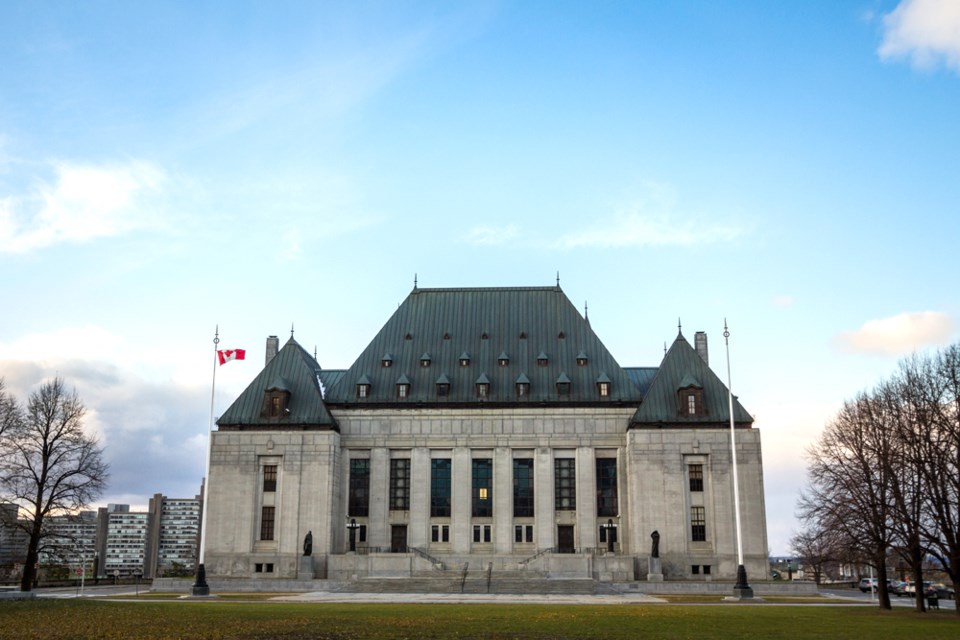A North Shore man’s eight-year prison sentence for sexual assault must stand, the Supreme Court of Canada has ruled.
Canada’s top court released a decision Oct. 27, ruling on a legal challenge brought against a North Vancouver provincial court judge’s sentencing.
A publication ban covers the names of the victims and any information that may identify them. Because the offender was their uncle, his identity must be concealed.
According to the court ruling, the offender began sexually assaulting his 13-year-old niece soon after she moved in with his family. Those assaults continued for five years. When he was 27, he sexually assaulted another niece, who was 15 at the time, while she was staying overnight at his family’s home.
The victims eventually reported the abuse to police and, in December 2019, the offender pleaded guilty to two counts of sexual assault.
At issue before Canada’s highest court was the sentence. Following his guilty pleas, the Crown argued the offender should spend four to six years in prison, while his defence submitted that three to three and a half years would be more appropriate.
But the North Vancouver judge went over and above both the Crown and defence’s submissions and sentenced him to eight years in jail, citing several aggravating factors: that his victims were family members and under the age of 18, that they were in a family home where they should have felt safe, and that the assailant did not use a condom, thereby exposing the victims to even greater risks.
Under established case law in Canada, the courts will accept a lesser sentence in exchange for a guilty plea that will spare the court from a lengthy and costly trial and spare the victims from the trauma of having to testify. When those guilty pleas are entered after the Crown and defence have already negotiated a joint submission on what the sentences should be, judges rarely go outside that range unless it would “bring the administration of justice into disrepute, or is otherwise contrary to the public interest.”
The offender argued he should have been entitled to the certainty that comes from a joint submission given that his second guilty plea only came after thorough negotiation and assurance of the Crown’s sentencing position.
But, writing for the majority on Supreme Court, Justice Michael Moldaver noted that the offender and the Crown did not agree on the sentence, thereby requiring court time and negating much of the benefit that comes from a joint submission.
“[The offender's] sentencing hearing took an entire day. The Crown and the defence properly put their best foot forward, providing lengthy submissions in support of the reasonableness of their positions. Following the hearing, the judge needed two weeks to deliberate and render a written decision.
Capping sentences at the high end of the range sought by the Crown would also effectively cede the responsibility of sentencing, which is supposed to remain with the judiciary to craft in proportion to the gravity of the offence and the offender’s degree of responsibility, Moldavar added.
The majority on the court agreed, though, that when a judge is considering a sentence higher than what the Crown is seeking, they should inform both the Crown and defence as soon as possible, and allow them to make further submissions that relate specifically to the concerns flagged by the judge.
The offender argued that because his harsher sentence came as a surprise, he was denied procedural fairness. The majority on the court disagreed with that as well.
“Although the sentencing judge failed to provide notice that she was planning to exceed the Crown range and to provide an opportunity for further submissions, there was no impact on the sentence. [The assailant] has not demonstrated that he had information to provide to the sentencing judge that would have impacted his sentence,” Moldaver wrote.
Although the court had already decided that the offender wasn’t entitled to a new or lesser sentence, they did opt to affirm the North Vancouver sentencing judge’s position noting that “upper-single and double-digit penitentiary terms for sexual offences against children should not be unusual.”
“[The offender’s] prolonged and profoundly harmful actions irreparably impacted the lives of two young Indigenous women. His actions highlight the heightened risk of sexual assault faced by marginalized young women. [The assailant] was in a position of trust as the victims’ uncle and violated them while they were in a vulnerable position, asleep at their grandmother’s house. Eight years cannot be said to be a demonstrably unfit sentence for his crimes.”



